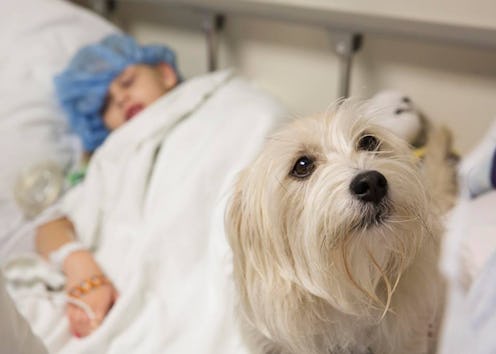News
How This Dog Is Helping Save A Little Girl's Life

Some service dogs guide the blind out of harm's way — and some use their dog-superpowers to detect tiny changes in their humans to keep them from a serious medical emergency. JJ the terrier is in the latter category, and the dog just helped his seven-year-old owner, Kaelyn Krawczyk, through surgery. And when we say "helped," we don't just mean emotional support — JJ is trained to pick up on tiny charges in his Krawczyk's body before medical machines do, so he literally sat in on the medical procedure.
JJ's own personal human is seven-year-old Krawczyk, KK to her friends, who has mast cell activation disorder. The condition is an autoimmune disorder brought on by an excess of mast cells, which normally help the immune system. But a buildup can cause the cells to go haywire when triggered, with effects ranging from fatigue to anaphylactic shock.
Reactions can be brought on by a wide range of things, from fatigue to certain foods. Because of her condition, KK goes to the hospital regularly for treatment. The catch? The anesthetic the doctors use is one of her triggers. Which is where JJ comes in.
In a rare decision, doctors at Duke Hospital decided to let the dog into the operating room during one of KK's recent surgeries.
Sure, at first they were were skeptical — dogs and surgical procedures on humans don't tend to go well together — but they were won over by the fact that JJ can sense changes in KK's system before they're even registered by machine monitors. The dog can sense what's going on with KK before cutting-edge technology begins to get there, basically.
JJ isn't alone in this regard: medical-alert dogs are a whole category of service animal that can be trained to sense anything from an impending diabetic blood sugar crash, to an oncoming seizure in their humans. Still, they're not usually allowed into operating rooms.
We haven't been this choked up over a canine-human relationship since Homeward Bound.
Images: Duke Children's Hospital/Facebook